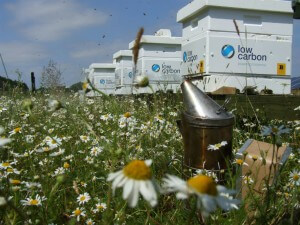 Leading sustainability business Plan Bee Ltd is going high tech in its mission to save endangered honeybees.
Leading sustainability business Plan Bee Ltd is going high tech in its mission to save endangered honeybees.
With honeybee populations virtually across Europe having been decimated in the last two decades alone, UK beehive management business Plan Bee Ltd is turning to technology in a bid to gather greater evidence.
The eco-innovator is working together with renewable energy partner Low Carbon to install unique monitoring systems that not only measure hive temperatures and humidity, but also hive acoustics.
As well as the effects of climate change, poor pesticide management and man’s impact on the environment, honeybee colonies are also being hit with ‘hive rustling’, where commercial hives are stolen from farms and sold on for their valuable contents. Monitoring can also help to track any such stolen hives.
The data monitors not only collect information on conditions within the hive, but also map the daily flight information, fanning activity and access the efficiency within the collection and processing of the colony’s nectar.
Most importantly, the system studies the major influence played by the external environment on various colonies. The initial instrumentation will be hosted at Low Carbon solar parks across the south of England, from Cornwall and Dorset to Suffolk.
Quentin Scott, Low Carbon’s Marketing Director added:
“Our solar parks, as well as providing a source of clean, renewable energy, can also provide a safe, biodiverse home for honeybees. Already they offer a protected habitat to a number of species. We welcome the development of this innovative monitoring technology and we’re only too happy to assist Plan Bee in their pioneering efforts, particularly if it helps to safeguard bees now and for the future.”
Hive monitoring can provide the greatest reliability and consistency in environmental monitoring. All data collected is time-stamped to the second, and isn’t reliant on manual operation. Locating on relatively isolated solar parks, adjacently located to agricultural land provides a unique location to monitor impacts away from man-made influences. It could also provide valuable information for farmers.